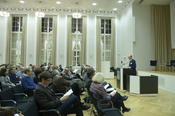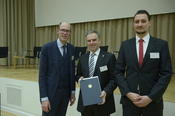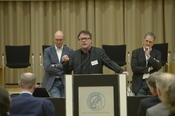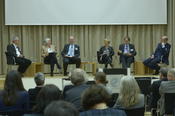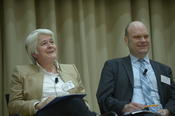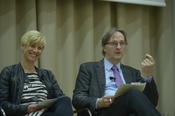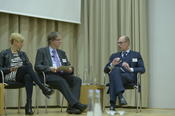Universitäten und außeruniversitäre Einrichtungen
On January 27, the event “Universitäten und außeruniversitäre Einrichtungen. Wissenschaftliche Kooperationen und Karrierewege am Beispiel des Forschungscampus Berlin-Dahlem“ took place in the Harnack-Haus of the Max Planck Society. Cooperation between Freie Universität and its non-university partners has grown increasingly important in teaching, research and the promotion of junior researchers. The event presented successful cooperation projects while considering chances and challenges of regional collaborations. All interested researchers of Forschungscampus Berlin-Dahlem as well as the junior researchers of Junges Wissenschaftsforum Dahlem were cordially invited.
In the first part of the evening, chemist Prof. Dr. Rainer Haag and his student Leonard Urner were awarded the Teaching Award of Freie Universität Berlin 2014. They presented their winning project Trans.Pro.Idee („Translation von Projektideen in Forschungs- und Startup-Vorhaben“), which enables master students to develop their own ideas for projects. They then check their idea for market and research potential and finally try to realize it independently. Researchers from non-university institutions, as well as entrepreneurs from the region, contribute to this project: they discuss their experiences with participating students in a lecture series.
Afterwards, the guests gained further insight into regional cooperation in research and the promotion of junior researchers from three points of view: Prof. Dr. Knut Reinert’s laboratory is made up of one research group of Freie Universität and one of the Max Planck Institute for Molecular Genetics, Prof. Dr. Christoph Schütte, vice president of the Zuse Institute Berlin and professor at the Institute of Mathematics at Freie Universität helped to establish the DFG Center of Excellence MATHEON, Prof. Dr. Michael Zürn, who works at WZB Berlin Social Science Center and the Otto Suhr Institute of Political Science also heads the Berlin Graduate School for Transnational Studies of WZB, Freie Universität and Hertie School of Governance.
Their talks were followed by a panel discussion between the heads of Helmholtz-Zentrum Berlin, the German Archaeological Institute (DAI), the Leibniz Institute for Zoo and Wildlife Research (IZW) and the Max Planck Institute for Molecular Genetics as well as the president of Freie Universität Berlin. After discussing success factors and obstacles of regional cooperation between universities and non-university institutions, they all agreed that joint projects require constant commitment to work, functional communication, reliability and mutual trust. Financial incentives can be beneficial, but the desire to commit to more complex questions, manageable in joint efforts only, is more important. The Berlin area, in Dahlem but also beyond, offers ideal conditions with its excellent researchers, complementary foci and short routes. Therefore, the exchange between the members of the panel discussion will be actively pursued in the future.

